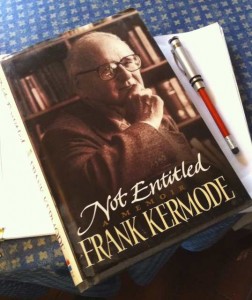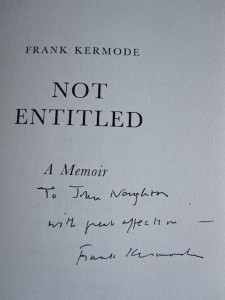Frank Kermode died yesterday. He was the most erudite man I’ve ever known, and the best company. He had a lovely sense of humour and a smile that — literally — seemed to twinkle. He first came into my life as a distant presence — as General Editor of the Fontana Modern Masters series, ideal material for an autodidact like me. It was only in the 1990s that I got to know him in person, for it turned out that we had a good friend in common.
From that time onwards, I have nothing but nice memories: of calling on him in his comfortable, elegant, book-lined Pinehurst flat on my way home, and being entertained therein with strong liquor, cigars and gossip; of the way he always came to greet one as the lift door opened onto his landing; of his annual declaration that this year’s new book would be his last; of his willingness to come to lunch or dinner at insanely short notice; of being his guest at great and small occasions in his college (King’s); of his culinary diffidence; of serving as one of his informal IT-support people (the other was my friend Quentin) in his early days on email (he was an early Mac user); of his wonderfully ironic detachment about the vicissitudes of academic politics; and of the paradoxical way he combined supreme self-confidence in his own judgement with a bemused amusement at his elevated status in society.
This paradox was beautifully captured in the title of his autobiography — Not Entitled, of which my inscribed copy is a treasured possession. Frank felt that he was always, somehow, an outsider. One evening I was his guest at a lavish feast in King’s — the one where they put out the College’s amazing collection of silver and gold plate. Around us at the table were seated various examples of Establishment and academic worthiness and success. Frank was wearing the medal that came with his Knighthood, and was being treated by other guests with the deference that his eminence warranted. “Surely”, I said to him, “you must have got over that feeling of non-entitlement by now?” He shook his head. “It’s not something you get over”, he replied.
LATER: Quentin has some nice memories too, including this:
I remember his surprised embarrassment when I discovered, after dismantling his computer, that the reason he could no longer push a CD into the CD-drive was that on some distant past occasion he had pushed a 5.25″ floppy disk into the same slot.
I remember discussing Tolkien with him after seeing the first Lord of the Rings film, and he said that W.H. Auden had once asked him, “Don’t you think Tolkien is a wonderful writer?” To which he replied that no, he didn’t really think so. “I respect you for saying that”, said Auden, “but I’ll never trust your opinion again.”
Alan MacFarlane has done a wonderful extended interview with Frank which seems to me to capture exactly everything that was special about him.







